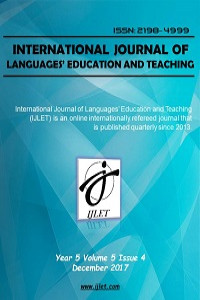The Opinions of Parents and Students on the Course of Turkish Language and Culture in France: An Example from Aveyron Region
Öz
The study aims to analyze the opinions of the students and parents of Turkish origin in France on the course of Turkish Language and Culture. Performed as “a case study”, which is one of qualitative research approaches, this study was participated by a total of 20 parents and 40 students in the beginning of the 2017-2018 academic year. The findings demonstrate that both the parents and the students mostly used the expression of Turkish School for the course of Turkish Language and Culture. The findings obtained from the opinions of the parents indicate that the course of Turkish Language and Culture improved the speaking, writing and reading skills of the students, that the students reviewed the activities performed in the course of Turkish Language and Culture at home and in their daily life, and that after they participated in the course, their interest in Turkish and the course increased. The study concluded that the students attended the course of Turkish Language and Culture due to various reasons such as learning Turkish, fulfilling the wish of their families for enrolling in the course, having friends who attend the course, speaking Turkish well and effectively during their travel to Turkey, seeking to obtain the certificate of participation for the course, and being eligible to take part in the National Sovereignty and Children's Day program. In the study, the parents and the students stated that they speak Turkish at home, use the media tools in Turkish, read Turkish books at home and spend their holiday in Turkey and that the course enables them to improve their Turkish skills.
Anahtar Kelimeler
Mother tongue education France the course of Turkish Language and Culture
Kaynakça
- Arı, T. G. (2015). İki dilli Türk çocuklarının ve velilerin ana dili Türkçeyi öğrenme tutumları (Aisne Bölgesi- Fransa örneği). 15 Nisan 2017 tarihinde “http://s3.amazonaws.com/academia.edu.documents/45256191/IKI_DILLI_TURK_COCUKLARININ_VE_VELILERIN_1.pdf?AWSAccessKeyId=AKIAIWOWYYGZ2Y53UL3A&Expires=1494896366&Signature=nPHK%2FjR4Q0IvCCyXzY%2BptJrYGgI%3D&response-content-disposition=inline%3B%20filename%3DIKI_DILLI_TURK_COCUKLARININ_VE_VELILERIN.pdf” adresinden alınmıştır.
- Arıcı, B. ve Kırkkılıç, H. A. (2017). Yurt dışında görev yapan Türkçe ve Türk Kültürü öğretmenlerinin Türkçe ve Türk Kültürü derslerine ilişkin görüşleri. Akademik Sosyal Araştırmalar Dergisi [The Journal of Academic Social Science], 41, 480-500.
- Bal, K. (2013). Kitle iletişim araçlarının yurt dışındaki Türk çocuklarının ana dili öğrenimi ve kimlik algısı üzerindeki etkisi. Türkçe Araştırmaları ve Akademik Öğrenci Dergisi, 5, 1- 14.
- Bekir, H. Ş. ve Temel, Z. F. (2006). Almanya’da okul öncesi eğitim kurumlarına devam eden 5- 6 yaş grubu Türk çocuklarına uygulanan dil eğitim programının dil gelişim düzeyine etkisi. Gazi Üniversitesi Endüstriyel Sanatlar Eğitim Fakültesi Dergisi, 18, 14-27.
- Belet, Ş. D. (2009). İki dilli Türk öğrencilerin ana dili Türkçeyi öğrenme durumlarına ilişkin öğrenci, veli ve öğretmen görüşleri (Fjell İlköğretim Okulu Örneği, Norveç). Selçuk Üniversitesi Sosyal Bilimler Enstitüsü Dergisi, 21, 71-85.
- Çelik, Y. ve Gülcü, İ. (2016). Yurtdışında kullanılan Türkçe ve Türk Kültürü ders kitaplarına yönelik öğretmen görüşleri. Bartın Üniversitesi Eğitim Fakültesi Dergisi, 5 (2), 287-296.
- Direction des services départementaux de l’éducation Nationale (DSDEN) Lozere (2016). Réunion d’accueil des enseignants EILE/ELCO. 16 Nisan 2017 tarihinde “https://ressources.ac-montpellier.fr/ftp_dsden48/espace%20educatif%20et%20pedagogique/langue-vivante-etrangere/REUNION%20RENTREE%20ELCO/R%C3%A9union%20d%E2%80%99accueil.pdf” adresinden alınmıştır. Ekiz, D. (2009). Bilimsel araştırma yöntemleri (2. Baskı). Ankara: Anı Yayıncılık.
Fransa’daki Türkçe ve Türk Kültürü Dersine Yönelik Veli ve Öğrenci Görüşleri: Aveyron Bölgesi Örneği
Öz
Çalışma, Fransa’daki Türk kökenli öğrencilerin ve velilerin Türkçe ve Türk Kültürü dersine ilişkin görüşlerini incelemeyi amaçlamaktadır. Nitel araştırma yaklaşımlarından “durum çalışması” ile ele alınan çalışma, 2017- 2018 eğitim- öğretim yılı başında, 20 veli ve 40 öğrencinin katılımı ile yürütülmüştür. Bulgular, hem velilerin hem de öğrencilerin günlük yaşamda Türkçe ve Türk Kültürü dersine yönelik çoğunlukla “Türk Okulu” ifadesini kullandıklarını göstermektedir. Veli görüşlerinden elde edilen bulgular, Türkçe ve Türk Kültürü dersinin öğrencilerin okuma, yazma ve konuşmalarında gelişme sağladığını, öğrencilerin Türkçe ve Türk Kültürü dersinde yapılan etkinlikleri evde ve günlük yaşamda tekrar ettiklerini, öğrencilerin derse katılımlarından sonra Türkçeye ve derse ilgilerinin arttığını göstermektedir. Çalışmada öğrencilerin; Türkçe öğrenme, ailenin derse katılım isteğini yerine getirme, dersi sevme, derse gelen arkadaşının olması, Türkiye’ye gittiğinde etkili ve güzel Türkçe konuşma, derse ilişkin katılım belgesini alma, Ulusal Egemenlik ve Çocuk Bayramı programında görev alabilme gibi nedenlerle Türkçe ve Türk Kültürü dersine katılım gösterdikleri sonucuna ulaşılmıştır. Çalışmada velilerin ve öğrencilerin ev ortamında Türkçe konuştuklarını, medya araçlarını Türkçe olarak kullandıklarını, evde Türkçe kitap okuduklarını ve tatillerde Türkiye’ye gittiklerini ifade ederek Türkçelerinin gelişimine destek olduklarını belirttikleri görülmektedir.
Anahtar Kelimeler
Kaynakça
- Arı, T. G. (2015). İki dilli Türk çocuklarının ve velilerin ana dili Türkçeyi öğrenme tutumları (Aisne Bölgesi- Fransa örneği). 15 Nisan 2017 tarihinde “http://s3.amazonaws.com/academia.edu.documents/45256191/IKI_DILLI_TURK_COCUKLARININ_VE_VELILERIN_1.pdf?AWSAccessKeyId=AKIAIWOWYYGZ2Y53UL3A&Expires=1494896366&Signature=nPHK%2FjR4Q0IvCCyXzY%2BptJrYGgI%3D&response-content-disposition=inline%3B%20filename%3DIKI_DILLI_TURK_COCUKLARININ_VE_VELILERIN.pdf” adresinden alınmıştır.
- Arıcı, B. ve Kırkkılıç, H. A. (2017). Yurt dışında görev yapan Türkçe ve Türk Kültürü öğretmenlerinin Türkçe ve Türk Kültürü derslerine ilişkin görüşleri. Akademik Sosyal Araştırmalar Dergisi [The Journal of Academic Social Science], 41, 480-500.
- Bal, K. (2013). Kitle iletişim araçlarının yurt dışındaki Türk çocuklarının ana dili öğrenimi ve kimlik algısı üzerindeki etkisi. Türkçe Araştırmaları ve Akademik Öğrenci Dergisi, 5, 1- 14.
- Bekir, H. Ş. ve Temel, Z. F. (2006). Almanya’da okul öncesi eğitim kurumlarına devam eden 5- 6 yaş grubu Türk çocuklarına uygulanan dil eğitim programının dil gelişim düzeyine etkisi. Gazi Üniversitesi Endüstriyel Sanatlar Eğitim Fakültesi Dergisi, 18, 14-27.
- Belet, Ş. D. (2009). İki dilli Türk öğrencilerin ana dili Türkçeyi öğrenme durumlarına ilişkin öğrenci, veli ve öğretmen görüşleri (Fjell İlköğretim Okulu Örneği, Norveç). Selçuk Üniversitesi Sosyal Bilimler Enstitüsü Dergisi, 21, 71-85.
- Çelik, Y. ve Gülcü, İ. (2016). Yurtdışında kullanılan Türkçe ve Türk Kültürü ders kitaplarına yönelik öğretmen görüşleri. Bartın Üniversitesi Eğitim Fakültesi Dergisi, 5 (2), 287-296.
- Direction des services départementaux de l’éducation Nationale (DSDEN) Lozere (2016). Réunion d’accueil des enseignants EILE/ELCO. 16 Nisan 2017 tarihinde “https://ressources.ac-montpellier.fr/ftp_dsden48/espace%20educatif%20et%20pedagogique/langue-vivante-etrangere/REUNION%20RENTREE%20ELCO/R%C3%A9union%20d%E2%80%99accueil.pdf” adresinden alınmıştır. Ekiz, D. (2009). Bilimsel araştırma yöntemleri (2. Baskı). Ankara: Anı Yayıncılık.
Ayrıntılar
| Birincil Dil | Türkçe |
|---|---|
| Konular | Türkçe Eğitimi |
| Bölüm | Araştırma Makalesi |
| Yazarlar | |
| Yayımlanma Tarihi | 30 Aralık 2017 |
| Yayımlandığı Sayı | Yıl 2017 Cilt: 5 Sayı: 4 |


